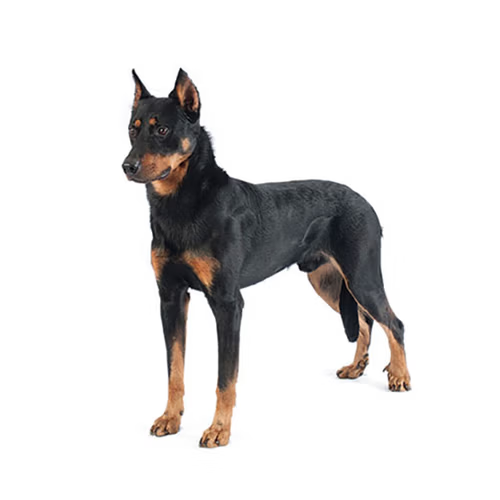
Beauceron
Impressive, large and muscular, the Beauceron is an attractive dog with a smooth short coat and drop ears.
The need-to-know
- Dog suitable for experienced owners
- Extra training required
- Enjoys vigorous walks
- Enjoys walking more than two hours a day
- Large dog
- Some drool
- Requires grooming every other day
- Non hypoallergenic breed
- Chatty and vocal dog
- Guard dog. Barks and alerts
- May require training to live with other pets
- May require training to live with kids
Personality

Bold, courageous and quick to learn, the Beauceron is a people dog and a working dog. They dislike being left alone too long and benefit greatly from having a job to do. Strong willed and capable of independent decision making, the Beauceron is not suited to first time dog owners, but will excel with those who enjoy training and canine sports. Naturally a little suspicious of strangers due to their livestock guardian history, they will benefit from early and thorough socialisation and habituation to people and household life.
History and Origins

Country of Origin: France
Originating from the Beauce region of France, the Beauceron became a popular livestock herding and guarding breed throughout most of the north of the country. Thought to be closely related to the long-coated Briard and one of the founding breeds of the Doberman Pinscher, the Beauceron is the largest of the French sheepdogs. Also know as the ‘Bas Rouge’ (Red Stockings) because of their rich red coat markings, the Beauceron was used in the World Wars for multiple jobs including guarding, carrying messages and supplies and for land mine detection.
Nutrition and Feeding

Large breed dogs, as well as having large appetites, benefit from a different balance of nutrients including minerals and vitamins compared to smaller-breed dogs.
Exercise

This is still a working dog, with lots of energy and a clever, independent mind. Two hours exercise per day, with plenty of additional training and mental stimulation, is needed for the adult Beauceron. As their history as a working dog suggests, they do well at a variety of canine sports and competitions, although they may find the busy atmosphere of competition over-stimulating if not well socialised. They thrive when spending most of their time engaged with their human family, doing something together.
Other Information

Health and common issues
The Beauceron is generally a very healthy breed, but it is advised that breeding dogs are hip scored and eye tested to ensure the breed remains free of these problems. The breed club monitor the health of the breed carefully and should be contacted for the most up-to-date information and details of any DNA or additional testing they recommend. Breed Clubs can be found on the Kennel Club website.
Space requirements
This is a big dog that likes to spend a lot of time outdoors, so the home should be able to accommodate those needs. A secure garden is essential as these are large, athletic animals easily capable of jumping or climbing insubstantial fencing. Access to interesting and varied local walks will help keep your Beauceron entertained, and while in the right house and with the right management they can live almost anywhere with enough space, they are likely to do better living in the country or very close to it.
Training beaucerons
Easily trained using positive, modern methods, the Beauceron can turn a paw to any activity you’d care to try, including agility, man-trailing, Rally, Canicross, obedience, and much more. Careful attention should be paid to teaching a good recall and care should be taken around livestock. Early socialisation with other family pets, visitors and children is vital. This is a dog for someone who enjoys exercise and training in their own right, rather than as a means to a quiet dog!
Best family dog breeds
The Beauceron is excellent with their own family but this is a large dog who as a puppy is likely to be clumsy and boisterous. They may also be suspicious of visitors. This in conjunction with the amount of exercise and training they require is likely to mean they are not suited to very busy families or those with younger children. While many dogs are traditionally thought of as being good with children, all dogs and children need to be taught to get on with and respect each other, and be safe together. Even so, dogs and young children should never be left alone together and adults should supervise all interactions between them.
Did you know?
- The Beauceron used to protect sheep and other farm livestock against wolves, which were once common across rural northern France.
- Despite being relatively rare, the Beauceron has racked up a number of film appearances, including a James Bond movie, Moonraker; the 1990 Luc Besson film Nikita, and in Martin Scorsese’s Gangs of New York.
- Sometimes the Beauceron is known as the ‘Berger de Beauce’ which translates to ‘sheepdog of Beauce’.
- This dog breed has double dewclaws which gives them better traction on rough terrain.
- The Beauceron was used in both world wars and took on a range of tasks from messengers, to transporters and even land mine detectors!